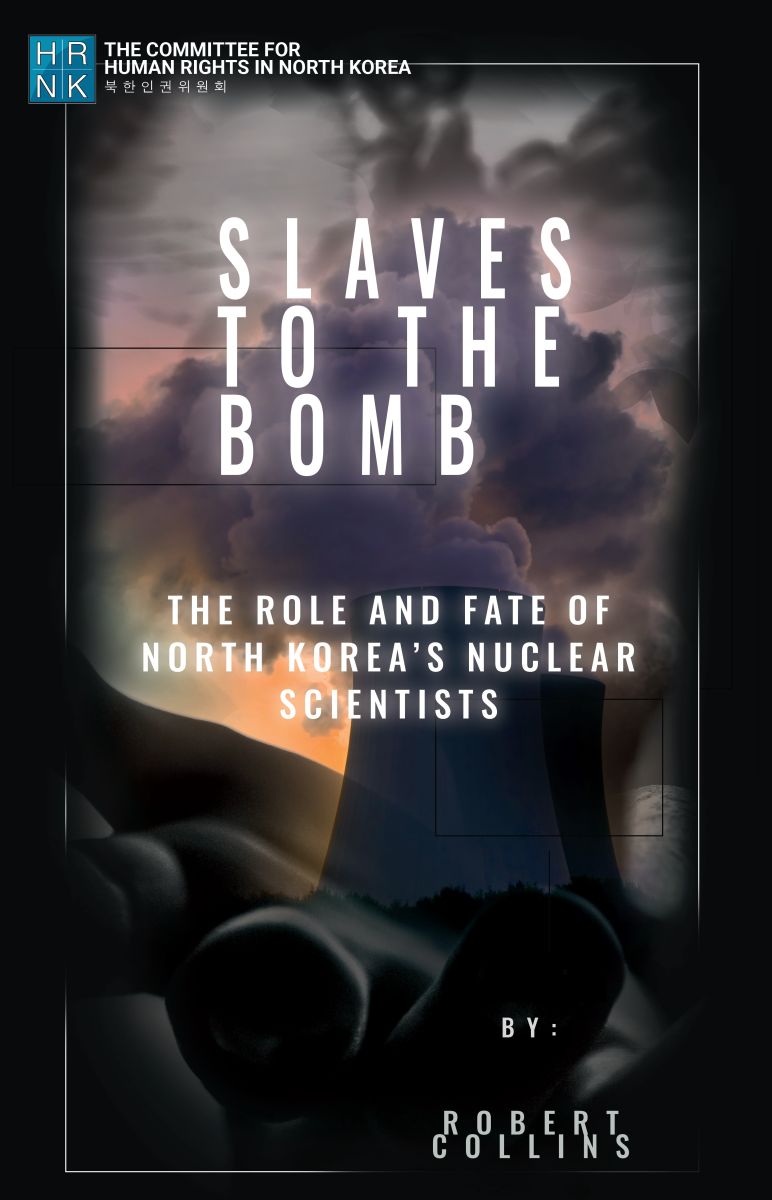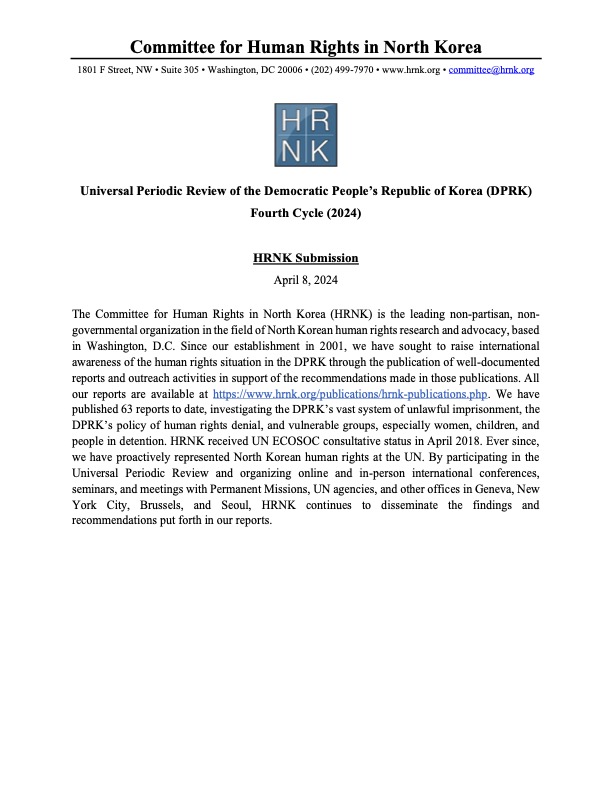HRNK is delighted to announce that Dr. Sung-Yoon Lee and Dr. Sue Mi Terry have joined HRNK's Board of Directors. We look forward to their contributions to our work and mission.
Their full biographies are enclosed below. On behalf of HRNK's Board Members and staff, I would like to take this opportunity to welcome Dr. Lee and Dr. Terry to HRNK.
Greg Scarlatoiu
Executive Director
Sung-Yoon Lee is a fellow at the Woodrow Wilson International Center for Scholars. Previously, he taught Korean history and politics at the Fletcher School of Law and Diplomacy at Tufts University. He has also served as a Faculty Associate at the Program on U.S.-Japan Relations in the Weatherhead Center for International Affairs at Harvard University.
He is the author of The Sister: The Extraordinary Story of Kim Yo Jong, North Korea’s Most Powerful Woman (London: MacMillan, 2023).
Dr. Lee’s essays on the international politics of the Korean Peninsula and Northeast Asia have been published multiple times in The New York Times, The Wall Street Journal, The Washington Post, The Los Angeles Times, Foreign Affairs, Foreign Policy, Christian Science Monitor, CNN, and other outlets. He is a regular contributor to The Hill.
Dr. Lee has testified as an expert witness at the U.S. House of Representatives Committee on Foreign Affairs and Subcommittee on Asia Hearings on North Korea policy and has advised senior officials and elected leaders, including the President of the United States. He has also testified as an expert witness on behalf of the plaintiffs in the U.S. District Court for the District of Columbia in the Warmbiers v. DPRK case, in which the plaintiffs were awarded $501 million, and on behalf of the defendant in the U.S. District Court for the Central District of California (LA) in the USA v. Christopher P. Ahn extradition hearing.
Dr. Lee has a B.A. in American and British literature from the New College of Florida, and obtained his M.A. and Ph.D. from the Fletcher School of Law and Diplomacy at Tufts University.
Sue Mi Terry is senior fellow for Korea studies at the Council on Foreign Relations (CFR). She researches and writes on policy issues relevant to the Korea Peninsula, U.S.-Korean relations, and security issues in Northeast Asia. Terry is one of the world’s leading experts on the Korean Peninsula and East Asia, with extensive experience in intelligence, policymaking, academia, and think tanks. She previously served at CFR as a national intelligence fellow from 2010 to 2011.
Terry was most recently director of the Asia program and the Hyundai Motor-Korea Foundation Center for Korean History and Public Policy at the Wilson Center from 2021 to 2023. She was a senior fellow with the Korea chair at the Center for Strategic and International Studies from 2017 to 2021. From 2015 to 2017, she was managing director for Korea at Bower Group Asia. Terry was a senior research scholar at Columbia University’s Weatherhead East Asian Institute from 2011 to 2015.
Terry was deputy national intelligence officer for East Asia at the National Intelligence Council from 2009 to 2010. From 2008 to 2009, she was the director of Korea, Japan, and Oceanic Affairs at the National Security Council under Presidents George W. Bush and Barack Obama. Terry served as a senior analyst at the CIA from 2001 to 2008, where she produced hundreds of intelligence assessments.
She has taught at Tufts University, Georgetown University, the Johns Hopkins University’s School of Advanced International Studies, Seoul National University, and the University of Chicago, where she was a 2019 Pritzker Fellow at the Institute of Politics.
Terry is a producer of Beyond Utopia, an acclaimed documentary film about refugees escaping North Korea that won the 2024 DuPont-Columbia Award for excellence in broadcast journalism, was shortlisted for an Academy Award and nominated for a BAFTA Award. She is also co-author of the 2023 book South Korea’s Wild Ride: The Big Shifts in Foreign Policy from 2013 to 2022. She has written numerous articles in prominent publications including Foreign Affairs, New York Times, Washington Post, Wall Street Journal, Los Angeles Times, and Chosun Ilbo.
Terry has testified multiple times before the U.S. Senate and House of Representatives, as well as the U.S.-China Economic and Security Review Commission. A former MSNBC commentator, she is a regular guest on television, radio, and podcasts, including CNN, ABC, PBS, BBC, and NPR.
Terry received a B.A. in political science from New York University and an M.A. and Ph.D. in international relations from the Fletcher School of Law and Diplomacy at Tufts University. Born in Seoul and raised in northern Virginia, she now lives with her family in New York City.
To understand the challenges faced by the personnel who are involved in North Korea’s nuclear program, it is crucial to understand the recruitment, education, and training processes through the lens of human rights. This report offers a starting point toward that understanding.
North Korea’s scientists and engineers are forced to work on the nuclear weapons program regardless of their own interests, preferences, or aspirations. These individuals may be described as “moder
In this submission, HRNK focuses its attention on the following issues in the DPRK:
- The status of the system of detention facilities, where a multitude of human rights violations are ongoing.
- The post-COVID human security and human rights status of North Korean women, with particular attention to sexual and gender-based violence (SGBV).
- The issue of Japanese abductees and South Korean prisoners of war (POWs), abductees, and unjust detainees.
This report provides an abbreviated update to our previous reports on a long-term political prison commonly identified by former prisoners and researchers as Kwan-li-so No. 25 by providing details of activity observed during 2021–2023.
This report was originally published on Tearline at https://www.tearline.mil/public_page/prison-camp-25.
This report explains how the Kim regime organizes and implements its policy of human rights denial using the Propaganda and Agitation Department (PAD) to preserve and strengthen its monolithic system of control. The report also provides detailed background on the history of the PAD, as well as a human terrain map that details present and past PAD leadership.

HRNK's latest satellite imagery report analyzes a 5.2 km-long switchback road, visible in commercial satellite imagery, that runs from Testing Tunnel No. 1 at North Korea's Punggye-ri nuclear test facility to the perimeter of Kwan-li-so (political prison camp) no. 16.
This report proposes a long-term, multilateral legal strategy, using existing United Nations resolutions and conventions, and U.S. statutes that are either codified or proposed in appended model legislation, to find, freeze, forfeit, and deposit the proceeds of the North Korean government's kleptocracy into international escrow. These funds would be available for limited, case-by-case disbursements to provide food and medical care for poor North Koreans, and--contingent upon Pyongyang's progress
For thirty years, U.S. North Korea policy have sacrificed human rights for the sake of addressing nuclear weapons. Both the North Korean nuclear and missile programs have thrived. Sidelining human rights to appease the North Korean regime is not the answer, but a fundamental flaw in U.S. policy.
(Published by the National Institute for Public Policy)

North Korea’s forced labor enterprise and its state sponsorship of human trafficking certainly continued until the onset of the COVID pandemic. HRNK has endeavored to determine if North Korean entities responsible for exporting workers to China and Russia continued their activities under COVID as well.
George Hutchinson's The Suryong, the Soldier, and Information in the KPA is the second of three building blocks of a multi-year HRNK project to examine North Korea's information environment. Hutchinson's thoroughly researched and sourced report addresses the circulation of information within the Korean People's Army (KPA). Understanding how KPA soldiers receive their information is needed to prepare information campaigns while taking into account all possible contingenc
This report is part of a comprehensive long-term project undertaken by HRNK to use satellite imagery and former prisoner interviews to shed light on human suffering in North Korea by monitoring activity at political prison facilities throughout the nation. This is the second HRNK satellite imagery report detailing activity observed during 2015 to 2021 at a prison facility commonly identified by former prisoners and researchers as “Kwan-li-so No. 14 Kaech’ŏn” (39.646810, 126.117058) and
This report is part of a comprehensive long-term project undertaken by HRNK to use satellite imagery and former prisoner interviews to shed light on human suffering in North Korea by monitoring activity at civil and political prison facilities throughout the nation. This study details activity observed during 1968–1977 and 2002–2021 at a prison facility commonly identified by former prisoners and researchers as "Kyo-hwa-so No. 3, T'osŏng-ni" and endeavors to e
This report is part of a comprehensive long-term project undertaken by HRNK to use satellite imagery and former detainee interviews to shed light on human suffering in the Democratic People’s Republic of Korea (DPRK, more commonly known as North Korea) by monitoring activity at political prison facilities throughout the nation. This report provides an abbreviated update to our previous reports on a long-term political prison commonly identified by former prisoners and researchers as Kwan-li-so<
Through satellite imagery analysis and witness testimony, HRNK has identified a previously unknown potential kyo-hwa-so long-term prison-labor facility at Sŏnhwa-dong (선화동) P’ihyŏn-gun, P’yŏngan-bukto, North Korea. While this facility appears to be operational and well maintained, further imagery analysis and witness testimony collection will be necessary in order to irrefutably confirm that Sŏnhwa-dong is a kyo-hwa-so.

"North Korea’s Long-term Prison-Labor Facility Kyo-hwa-so No. 8, Sŭngho-ri (승호리) - Update" is the latest report under a long-term project employing satellite imagery analysis and former political prisoner testimony to shed light on human suffering in North Korea's prison camps.

Human Rights in the Democratic Republic of Korea: The Role of the United Nations" is HRNK's 50th report in our 20-year history. This is even more meaningful as David Hawk's "Hidden Gulag" (2003) was the first report published by HRNK. In his latest report, Hawk details efforts by many UN member states and by the UN’s committees, projects and procedures to promote and protect human rights in the DPRK. The report highlights North Korea’s shifts in its approach
South Africa’s Apartheid and North Korea’s Songbun: Parallels in Crimes against Humanity by Robert Collins underlines similarities between two systematically, deliberately, and thoroughly discriminatory repressive systems. This project began with expert testimony Collins submitted as part of a joint investigation and documentation project scrutinizing human rights violations committed at North Korea’s short-term detention facilities, conducted by the Committee for Human Rights











